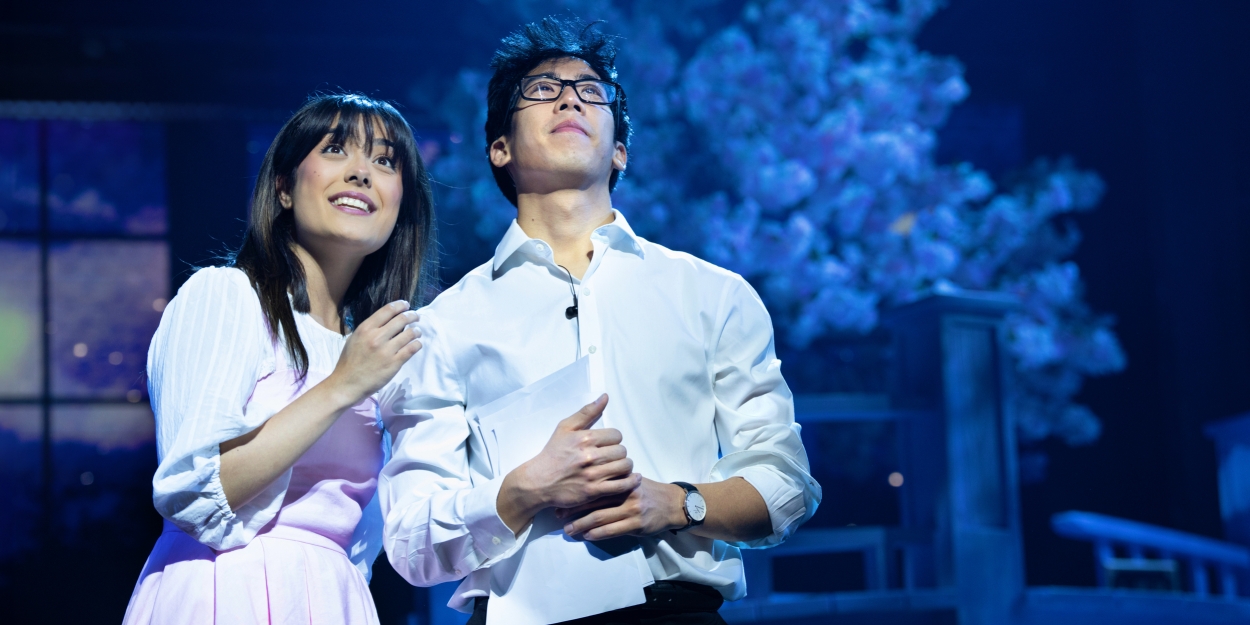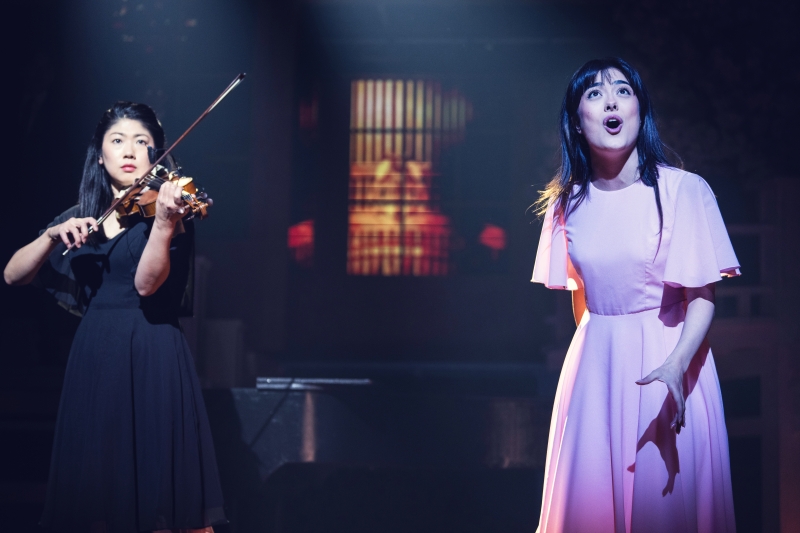Review: YOUR LIE IN APRIL, Harold Pinter Theatre
Manga-inspired musical lit up by sensational leads

 Musicals happen in places like ours, but not ours. People tend not to declaim their life’s ambition in song, confess undying love in a power ballad, regret their life decisions via a complex melody. Nor are we familiar with Japan when blanketed in cherry blossom, a beautiful environment pregnant with Springtime possibilities, carrying a weight greater than mere prettiness and hope.
Musicals happen in places like ours, but not ours. People tend not to declaim their life’s ambition in song, confess undying love in a power ballad, regret their life decisions via a complex melody. Nor are we familiar with Japan when blanketed in cherry blossom, a beautiful environment pregnant with Springtime possibilities, carrying a weight greater than mere prettiness and hope.
Like so many of the best musicals, in Your Lie in April, we’re invited into a heightened world, an anti-Ibsenesque space in which everything is a bit too much - it’s more operatic in its demands. Moreover, the show’s manga and anime roots poke through repeatedly in design and narrative conventions, knocking us a little more off-centre just when we need it.
As Dion and the Belmonts knew,
“One day I feel so happy, next day I feel so sad
I guess I'll learn to take the good with the bad”
when you’re “A Teenager in Love”.

That preamble is crucial though, because it’s no good standing aside from this show. Fold your arms and harumph and you’ll miss the point; get dizzy recalling that first flush of adolescent desire and the agony of its not being reciprocated, and you’re in.
We’ve all known a Kosei (Zheng Xi Yong), even if we’ve never met one. He’s the hyper-focused genius who can barely remember your name, the kid you wonder about whether he’s on the spectrum, the one who is carrying some damage behind the heavyweight spectacles. He plays the piano, but the way his mother, stick in hand like Bernarda Alba, demands. From such cruelty comes beautiful music, but Kosei is suffering, fights back with the only childish language he has but, when his mother (Lucy Park) dies from her chronic illness, the music is replaced by guilt. He can hear no more melodies and refuses to play.
He has friends though - feisty, tomboyish Tsubaki (Rachel Clare Chan) and the inevitable dim jock Ryota (Dean John Wilson). We clock straight away that the girl will get her heart broken and the boy isn’t quite as comically conceited as he appears.
Kosei’s safety blanket of self-indulgent moping is torn away by Kaori (Mia Kobayashi), the new girl, as extrovert as Kosei is introvert, open-hearted but mysterious, and strangely prone to fainting. She requests - no, demands, as girls like her never just request - that Kosei accompanies her violin in the music competitions that he once routinely won but now rejects. You can probably join the dots from there.
For all that, the show is a highwire act. Marrying (and honouring) manga artist, Naoshi Arakawa’s celebrated creation to Frank Wildhorn’s Broadway tunes and the lyrics of Carly Robyn Green and Tracy Miller is fraught with danger. Too far one way and a Gilbert & Sullivanesque dated Orientalism would seep through; too far the other, and it’s just another high school musical. Fortunately Rinne B Groff’s book steers a path through such traps and the songs are plenty good enough to stand on their own two feet.
The opening number, “If I Can’t Hear the Music”, is almost an 11 o’clock number in its own right and I wondered where the show could go from there, so big is its anthemic ambition. It sets a high bar but the show settles with standouts like “One Note” and “Catch a Shooting Star” destined for superfans’ playlists.
There isn’t much set piece dancing in the show, but director, Nick Winston, makes excellent use of a couple of surprising moments. Kaori’s playing is delivered by a shadow violinist (Akiko Ishikawa) while the girl disappears, underlining how music can transform human beings. None more so than when Kosei goes all in with his classical piano playing, dissing Vladimir Horowitz as a teen would and absolutely nailing Rachmaninoff, Zheng Xi Yong earning one of what will be many showstopping ovations, electrifying the house and providing an unforgettable moment.
The support cast are well up to West End expectations, Rachel Clare Chan’s vocals extremely pleasing on the ear. But it’s seldom one sees a performance, never mind a professional debut, like Mia Kobayashi, who does all the technical stuff well as the doomed heroine, but radiates superstar power. That charisma is indefinable, not amenable to analysis, and it’s a shock to see it as it’s very rare. To say that she can have any part she likes after this run would be a big shout, but I suspect she can.
With Spirited Away wowing fans and critics alike, it’s a good time for Japan inspired shows in London. Sure there’s big money behind them and they draw on solid IP roots, but they speak of a much-needed confidence in ambitious productions drawing on global inspiration. Perhaps 5 July 2024 was a new day in more ways than one.
Your Lie in April at the Harold Pinter Theatre until 21 September
Photo Credits: Craig Sugden


